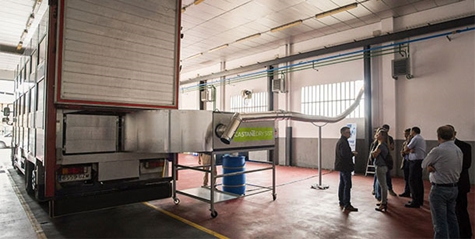New Truck Disinfection Process Prevents Disease When Transporting Livestock
By Jordi Tordera
In the spring of 2009, the H1N1 virus, also known as Swine flu, spread across the world. In June that same year, WHO declared it the first flu pandemic in 41 years, and studies published by experts of the CDC (Centers for Disease Control and Prevention) estimate the death toll during the first year of the pandemic was between 151,000 and 575,000.
In May 2013, PEDV (Porcine epidemic diarrhea Virus) was identified in swine for the first time in the United States. The virus, which was almost 100% lethal in piglets, and which spread across a large region, was 99% genetically similar to isolates from China, but it is unknown what the source of entry in the United States was.
Whatever the cause, epidemics like these represent billions in losses worldwide. History has taught us that prevention and control are key to avoid them, and contaminated livestock trailers represent one of the highest risks.
CASTAÑE, the company behind DRY SIST for truck disinfection, lies in one of the most important pork production regions in Spain. In a radius of 35 kilometres, 51,000 pigs are slaughtered every day. With decades of experience in the design and manufacturing of bodyworks for farm animal transportation vehicles, CASTAÑE decided to develop a reliable disinfection system to eradicate the epidemic threat from ground zero, the farm.
DRY SIST is a revolutionary new disinfection method that ensures a complete disinfection of the inside part of the truck without employing any chemicals. How is that possible? Through heat.
A study completed in 2013 by the Department of Veterinary Diagnostic and Production Animal Medicine (College of Veterinary Medicine, Iowa State University) focused on determining the best methods for inactivating PEDV in hog trailers.
Contaminated livestock trailers represent one of the highest risks.
CASTAÑE picked the most effective and least invasive of all to develop DRY SIST. The study concludes that PEDV in the presence of feces is 100% inactivated in temperatures of at least 72° C that are maintained over a period of 10 minutes. The study found that this was substantially more effective than chemical usage, which was not guaranteed to be 100% effective, and which could also contaminate, or stay present with, the next load of livestock to be transported.
These results led CASTAÑE to develop DRY SIST, a system that can be used on all types of food transportation vehicles but which is particularly relevant for the transportation of livestock. The system pumps hot air into the livestock cabin until it reaches 75° C and keeps it on that level for 15 minutes. The real trick, though, is to ensure that the temperature of 75° C is evenly applied to the whole inner surface of the vehicle, thus killing all harmful pathogens. The company used its expertise in bodyworks manufacturing to develop a method of sending the heat to all corners of the truck cabin, turning it into an oven that fully deactivates all viruses and bacteria. Temperature sensors were placed in all corners of the trucks during tests until 100% effectiveness was ensured.
DRY SIST certifies and registers each disinfection, ensuring that all trucks will be, for instance, free from PED, PRRS, E. Coli, Avian Influenza, etc. In times of possible epidemics, the system will allow companies to prove they are risk-free, and optimize their resources by using their vehicles for all kinds of livestock, at all times, not having to worry about contamination risk between species or loads. Sensors automatically indicate that the disinfection cycle has been completed.
DRY SIST is 100% effective and chemical free. The whole process takes 30 minutes, and could save millions of livestock, avoid billions in losses and, what’s more important, increase substantially our food safety. And, when all is said and done, in light of FSMA’s rule for preventive controls rolling out at the end of this year, it’s important that we look at technology and solutions that will expand our abilities to safeguard the world’s food supply.
About the Author
Jordi Tordera is International Markets Manager for Castañe and additionally works for other companies interested in accessing global export markets, the Chinese market in particular. Past work experience has included positions with the United Nations and the European Union Chamber of Commerce in China.
To have more articles like this emailed to your inbox, become a GFSR Member today!

-
 FeaturedRisk management
The Cost of a Breach: What a Cyberattack Could Mean for Food Safety Recalls
FeaturedRisk management
The Cost of a Breach: What a Cyberattack Could Mean for Food Safety Recalls
-
 FeaturedRisk management
Securing the Food Chain: How ISO/IEC 27001 Strengthens Cybersecurity
FeaturedRisk management
Securing the Food Chain: How ISO/IEC 27001 Strengthens Cybersecurity
-
 FeaturedRisk management
Revolutionizing Food Safety Training: Breaking Out of the “Check-the-Box” Mentality
FeaturedRisk management
Revolutionizing Food Safety Training: Breaking Out of the “Check-the-Box” Mentality
-
 GFSI Standards
GFSI 2025: Building Trust, Tech-Forward Solutions, and Global Unity in Food Safety
GFSI Standards
GFSI 2025: Building Trust, Tech-Forward Solutions, and Global Unity in Food Safety
-
 FeaturedFood Safety
Integrated Pest Management: Strategies to Protect Your Brand’s Reputation
FeaturedFood Safety
Integrated Pest Management: Strategies to Protect Your Brand’s Reputation
-
 FeaturedFood Safety Culture & Training
No Open Door Policy: Challenges That Impact Pest Control in Food Processing Plants
FeaturedFood Safety Culture & Training
No Open Door Policy: Challenges That Impact Pest Control in Food Processing Plants




